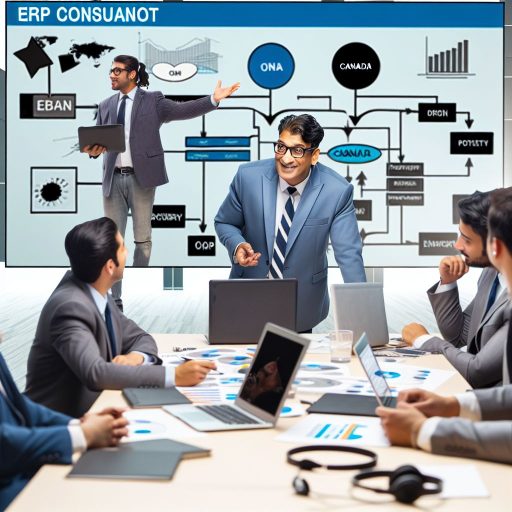Understanding the ERP Landscape
Key ERP Systems
Enterprise Resource Planning (ERP) systems integrate various business processes.
They help organizations streamline operations and enhance productivity.
Some popular ERP systems include SAP, Oracle, and Microsoft Dynamics.
SAP offers comprehensive modules tailored to different industries.
Oracle provides strong solutions for large enterprises seeking scalability.
Microsoft Dynamics excels in user-friendliness and integration with Microsoft products.
Modules and Solutions
ERP systems feature various modules to cover numerous business functions.
Common modules include finance, human resources, and supply chain management.
Each module serves specific needs, ensuring a complete solution.
Furthermore, customization options enhance flexibility for diverse businesses.
Integrating these modules allows for seamless data sharing across functions.
Choosing the Right ERP Solution
Selecting an ERP solution involves assessing business needs and goals.
Organizations must consider factors like budget, scalability, and support.
Vendor reputation also plays a crucial role in the decision-making process.
Moreover, it is vital to evaluate the implementation process and training requirements.
Careful planning ensures a smooth transition to the new system.
Trends in ERP Technology
The ERP landscape continually evolves with technological advancements.
Cloud-based solutions are gaining popularity for their flexibility and cost-effectiveness.
Additionally, artificial intelligence enhances data analysis and decision-making.
Mobile accessibility is also becoming essential for on-the-go management.
Staying updated with trends helps consultants recommend best practices.
Identifying Your Niche: Specialization within ERP Consulting
The Importance of Specialization
Specialization enhances your appeal in the competitive ERP market.
It enables you to offer targeted solutions to specific industries.
Moreover, specialized consultants often command higher fees.
They are perceived as experts due to their focused knowledge.
Unlock Your Career Potential
Visualize a clear path to success with our tailored Career Consulting service. Personalized insights in just 1-3 days.
Get StartedAssessing Your Interests
Begin by identifying your interests in ERP systems.
Consider which industries excite you the most.
Evaluate your previous experiences with ERP solutions.
Think about the types of challenges you enjoy solving.
Researching Market Demand
Investigate which niches have growing demand for ERP consultants.
Look for industry reports and surveys on ERP trends.
Also, observe job boards for in-demand ERP skills.
Networking with professionals can provide valuable insights.
Choosing Your Niche
After assessing your interests, narrow down your options.
Select a niche that aligns with both your passion and market demand.
For instance, industries like healthcare or finance often need ERP experts.
Commit to developing deep expertise in your chosen niche.
Marketing Your Niche Expertise
Once you establish your niche, create a dedicated online presence.
Utilize social media to share your knowledge and insights.
Write case studies showcasing your successful projects.
Furthermore, consider webinars to demonstrate your expertise.
Gathering Relevant Experience
Engaging in Projects
Take on projects that utilize your ERP skills.
These can be with existing employers or as independent ventures.
Choose projects that showcase your problem-solving abilities.
Document your role and contributions thoroughly.
Share your results and outcomes in your portfolio.
Pursuing Internships
Internships provide hands-on experience in ERP systems.
Seek internships with reputable firms or consultancies.
Focus on positions where you can actively participate.
Network with professionals during your internship.
Ask for feedback and take notes on your performance.
Exploring Freelancing Opportunities
Freelancing allows for flexibility and diverse experiences.
Look for short-term contracts or gigs online.
Platforms like Upwork and Freelancer offer various projects.
Choose freelance work relevant to your career goals.
Build a reputation through consistent quality work.
Explore Further: How Data Scientists Contribute To AI And Machine Learning
Documenting Success: Case Studies to Showcase Your Impact
Importance of Case Studies
Case studies serve as powerful evidence of your skills.
They allow potential clients to see tangible results.
Successful case studies enhance your credibility as a consultant.
Choosing the Right Projects
Select projects that demonstrate diverse skills.
Consider projects that faced significant challenges.
Highlight projects that produced measurable outcomes.
Additionally, choose projects relevant to your target market.
Structuring Your Case Studies
Start with an introduction to the project.
Provide background information and context.
Clearly outline your role in the project.
Discuss the challenges faced during the project.
Explain your approach to overcoming these challenges.
Present the solutions you implemented.
Finally, share the measurable results.
Highlighting Key Metrics
Use specific metrics to illustrate success.
Include percentages, time saved, or revenue increases.
Visual aids like charts can improve understanding.
Formatting and Presentation
Organize your case studies with clear headings.
Avoid jargon to keep content accessible.
Format case studies consistently for a professional look.
Real-World Example
Consider a case where you improved inventory management.
At Acme Logistics, you reduced costs by 20% within six months.
Implementing a new ERP system streamlined their processes.
The result was faster order fulfillment and increased customer satisfaction.
Gathering Feedback
Collect testimonials from satisfied clients.
Positive client feedback enhances the impact of your case studies.
Consider incorporating quotes directly into your documentation.
Utilizing Your Case Studies
Share case studies on your professional website.
Leverage social media platforms for wider reach.
Include case studies in your proposals and presentations.
Regularly update your case studies to reflect new achievements.
Learn More: Tools and Platforms Every Cloud Solutions Architect Uses
Building Technical Skills
Importance of Certifications
Certifications enhance your credibility as an ERP consultant.
They demonstrate your commitment to your profession.
Clients prefer consultants with recognized certifications.
Additionally, certifications can provide a competitive edge.
Popular ERP Certifications
- Certified SAP Consultant
- Oracle Certified Associate
- Microsoft Dynamics 365 Certification
- Certified Infor CloudSuite Consultant
These certifications cover various ERP tools.
Each has specific requirements and focuses on different skills.
Training Programs and Workshops
Participating in training programs can enhance technical skills.
Formal training exposes you to real-world scenarios.
Workshops provide hands-on experience with ERP software.
Look for programs that offer practical exercises and case studies.
Online Learning Resources
Many online platforms offer courses on ERP systems.
Websites such as Coursera, Udemy, and LinkedIn Learning are valuable.
They feature modules on various ERP tools and practices.
Choose courses led by industry experts for the best insights.
Staying Updated on ERP Trends
Technology in ERP is continuously evolving.
Stay informed about the latest trends and updates.
Join online forums and communities related to ERP consulting.
This will keep you aware of new tools and best practices.
You Might Also Like: Canadian Universities Offering Machine Learning Programs

Creating a Personal Brand
Defining Your Brand Identity
Your personal brand represents your professional identity.
Start by identifying your unique skills and expertise.
Consider what sets you apart from other ERP consultants.
Use this identity to guide your branding efforts.
Developing an Online Presence
Your online presence is crucial in today’s digital age.
Begin with a professional website showcasing your portfolio.
Include case studies and client testimonials to build credibility.
Utilize social media platforms to share your insights.
Engage with industry professionals to expand your reach.
Networking Strategies
Networking is essential for career growth as an ERP consultant.
Attend industry conferences and seminars regularly.
Join relevant professional organizations and online forums.
Actively participate in discussions to showcase your knowledge.
Connect with past colleagues and clients for opportunities.
Leveraging LinkedIn
LinkedIn is a powerful tool for building your professional network.
Optimize your profile with a professional photo and headline.
Share articles or posts relevant to ERP trends and technologies.
Engage with others by commenting on their posts.
Consider joining LinkedIn groups related to ERP consulting.
Building Relationships
Focus on forming genuine connections within your network.
Follow up after meeting new contacts at events.
Offer assistance or share resources to maintain relationships.
Consider setting up informational interviews with industry leaders.
Always thank your connections for their support and advice.
Find Out More: Pathways To Becoming An Artificial Intelligence Specialist
Tailoring Your Portfolio: Customization for Different Industries
Understanding Industry Needs
Every industry has unique challenges and requirements.
Identifying these needs is crucial for effective consulting.
Analyze the specific operational aspects of your targeted industry.
This understanding informs your portfolio development.
Consider sectors like manufacturing, healthcare, and retail.
Showcasing Relevant Skills
Your portfolio must highlight skills that match industry demands.
For manufacturing, focus on process optimization and supply chain management.
In healthcare, emphasize compliance and patient management expertise.
Retail consultants should showcase skills in customer relationship management.
Different industries value different competencies.
Utilizing Case Studies
Incorporate case studies that demonstrate successful projects.
Select examples from the industries you wish to target.
Your case studies should reflect distinct challenges and solutions.
Include quantifiable outcomes to highlight your impact.
This method enhances the credibility of your portfolio.
Altering Visual Presentation
Adjust the graphics and layout of your portfolio as needed.
Use industry-specific visuals to engage potential clients.
For example, healthcare visuals may include clinical settings.
Conversely, manufacturing visuals might include assembly lines.
Tailoring the design keeps your audience interested.
Updating Regularly
Your portfolio should evolve alongside industry trends.
Regular updates maintain its relevance and accuracy.
Stay informed about technological advancements and market shifts.
Highlight any recent certifications or training you’ve completed.
This demonstrates your commitment to continual improvement.
Continuous Learning: Staying Updated on ERP Trends and Innovations
The Importance of Continuous Education
Continuous education is vital for ERP consultants.
The ERP landscape evolves rapidly with new technologies.
Staying informed enhances your consultancy skills.
Moreover, it differentiates you from competitors.
Best Practices for Staying Updated
Engaging in relevant training programs is essential.
Seek out workshops offered by recognized institutions.
Online courses from platforms like Coursera and Udemy are valuable.
Additionally, industry-specific certifications can enhance credibility.
Consider joining professional associations for resources and networking.
Leveraging Online Resources
The internet offers a plethora of learning tools.
Follow industry leaders on social media platforms.
Subscribe to newsletters from ERP software vendors.
Utilize blogs and podcasts focused on ERP trends.
Networking and Community Participation
Connecting with fellow consultants supports mutual learning.
Attend industry conferences and workshops to gain insights.
Participate in forums and discussion groups online.
Such networks often provide real-world information on trends.
Monitoring Industry Innovations
Stay informed about latest technological advancements.
Read reports from research firms focused on ERP solutions.
Moreover, follow case studies that illustrate practical applications.
Lastly, frequent updates from ERP solution providers should not be overlooked.




